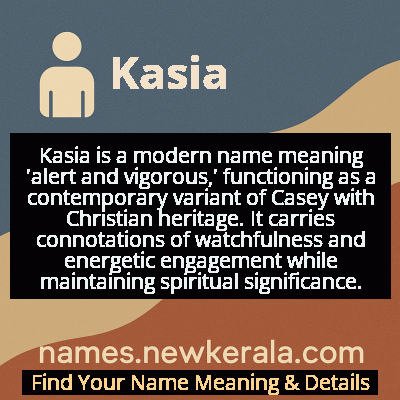Kasia Name Meaning & Details
Origin, Popularity, Numerology Analysis & Name Meaning of Kasia
Discover the origin, meaning, and cultural significance of the name KASIA. Delve into its historical roots and explore the lasting impact it has had on communities and traditions.
Name
Kasia
Gender
Male
Origin
Christian
Lucky Number
5
Meaning of the Name - Kasia
Kasia is a modern name meaning 'alert and vigorous,' functioning as a contemporary variant of Casey with Christian heritage. It carries connotations of watchfulness and energetic engagement while maintaining spiritual significance.
Kasia - Complete Numerology Analysis
Your Numerology Number
Based on Pythagorean Numerology System
Ruling Planet
Mercury
Positive Nature
Adventurous, dynamic, curious, and social.
Negative Traits
Restless, impatient, inconsistent, prone to indulgence.
Lucky Colours
Green, white.
Lucky Days
Wednesday.
Lucky Stones
Emerald.
Harmony Numbers
1, 3, 9.
Best Suited Professions
Sales, marketing, travel, entertainment.
What People Like About You
Versatility, charisma, adventurous spirit.
Famous People Named Kasia
Kasia Struss
Fashion Model
Polish model who has walked for major fashion houses including Chanel, Dior, and Prada
Kasia Nosowska
Singer and Songwriter
Lead vocalist of Polish rock band Hey and successful solo artist with multiple platinum albums
Kasia Cerekwicka
Singer
Polish pop singer known for hits like 'Na Kolana' and multiple music awards
Kasia Smutniak
Actress and Model
Polish-Italian actress known for roles in 'Perfect Day' and 'Domesticated'
Name Variations & International Equivalents
Click on blue names to explore their detailed meanings. Gray names with will be available soon.
Cultural & Historical Significance
The name's journey from diminutive to standalone name reflects broader cultural shifts in naming conventions across Eastern Europe, where traditional names are being reimagined for modern usage while preserving their cultural and religious significance. As Poland has maintained strong Catholic traditions, names like Kasia continue to carry spiritual meaning while fitting into global naming patterns. The name's international recognition has grown through Polish diaspora communities and cultural exports, making it a symbol of Polish identity in global contexts while maintaining its Christian foundations.
Extended Personality Analysis
Individuals named Kasia are often characterized by their alertness and vigorous energy, bringing enthusiasm and dynamism to their endeavors. They tend to be quick-witted observers with sharp intuition, able to assess situations rapidly and respond with precision. This alertness combines with a natural vigor that makes them proactive problem-solvers who approach challenges with determination and resilience. Their modern sensibility often manifests as adaptability and forward-thinking, allowing them to navigate contemporary complexities with grace.
Kasia's typically possess strong communication skills and emotional intelligence, making them effective in social and professional settings where their combination of traditional values and modern outlook serves them well. They often demonstrate leadership qualities tempered with empathy, creating balanced personalities that can inspire and connect with others effectively. The Christian heritage of the name may influence a tendency toward moral clarity and principled decision-making, while the modern variant aspect suggests flexibility and openness to new ideas. This creates individuals who are both grounded and progressive, capable of honoring tradition while embracing innovation.
Modern Usage & Popularity
In contemporary usage, Kasia has transitioned from being exclusively a Polish feminine name to gaining international recognition and occasional masculine usage, particularly in multicultural settings. While still predominantly used in Poland and among Polish diaspora communities, the name has seen increased global exposure through Polish celebrities and cultural exports. Its modern appeal lies in its crisp, contemporary sound combined with deep cultural roots, making it attractive to parents seeking names that balance tradition with modernity. The name maintains moderate popularity in Poland while gaining gradual recognition in other European countries and North America, particularly in communities valuing unique international names with strong heritage connections. Recent trends show Kasia being used more frequently outside traditional Polish contexts, reflecting broader patterns of cultural exchange and the globalization of naming practices.
Symbolic & Spiritual Meanings
Symbolically, Kasia represents vigilance and energetic engagement with life, embodying the qualities of watchfulness and active participation. The name carries connotations of purity and clarity through its connection to Katherine ('pure one'), while its modern usage adds layers of adaptability and contemporary relevance. As a name that bridges traditional Christian values with modern sensibilities, it symbolizes the integration of heritage and progress. The vigorous aspect suggests life force and determination, while the alert quality implies wisdom and perceptiveness. In metaphorical terms, Kasia represents the modern individual who maintains connection to roots while navigating contemporary challenges with energy and awareness, serving as a symbolic bridge between enduring values and evolving social contexts.

